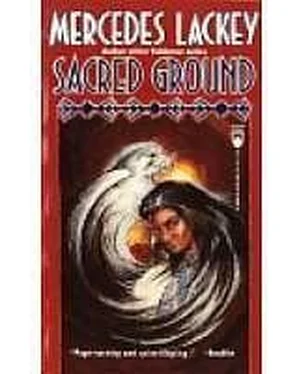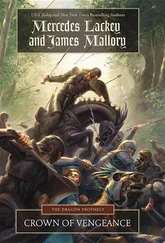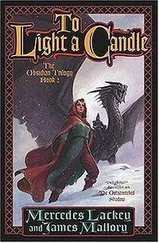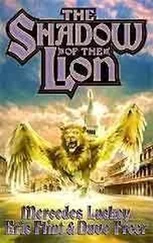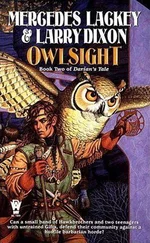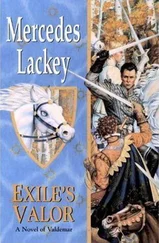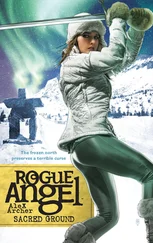The foreman knew when he was outgunned. With a muttered curse, he stalked over to his truck and picked up his cellular phone.
Larry drifted over to the rest. "What's next?" he asked no one in particular.
"Five to two he's callin' Calligan," Tagliono said, and spat off to one side.
Larry nodded. "I figured," he said. "Question is, what's Calligan gonna do about it?"
Silence for a moment; traffic noise from the highway nearby warred with the piercing wails of killdeers overhead. Then one of the dump truck operators spoke up.
"I was on a project that hit somethin' like this," he offered. "Feds made 'em close down."
"Permanently?" Tagliono asked. The man shook his head.
"Naw. Just long enough for some college guys to get in there and dig the stuff up, like on TV." He scratched his head, meditatively. "But that was like, some old fort or something. I dunno what they'd do about somethin' like this."
Neither did anyone else, it appeared. The foreman was deep in conversation on his phone, and the rest of them were at something of a loss. Not for the first time, Larry regretted that he hadn't popped for the cost of one of those phones.
He'd have liked to put in a couple of calls-to the Osage Principal Chief for one, and to old man Talldeer for another. But he didn't dare leave the site, because right now, from the dirty looks he was getting, it looked like the foreman would be willing to use any excuse to fire him.
The foreman shoved the phone back into his car and stalked back, the look on his face boding no good for anyone who got in his way.
"The boss says that he wants us to dig the stuff up and trash it-burn it or throw it in the river or bury it or something," he said shortly. "Otherwise the Feds are gonna get in here, drag in the college people, and start holding things up while they screw around."
That was when Larry decided that no amount of money was worth violating a burial site. He got on his dozer, with a silent apology to those buried there, and backed up. Carefully. Doing his best not to disturb things any more than he already had.
The dozer was a cranky old bitch, and he used his long familiarity with her to kill her and flood her carburetor. She coughed and died; he made some elaborate "attempts" to restart her, then held up his hands.
"Sorry," he said, face carefully blank. "I guess she needs some work."
The foreman's face turned tomato-red, but there wasn't anything he could do if the dozer had stalled, no matter what the cause. The way he was glaring at Larry boded no good for the future, but he had no choice but to order a second piece of equipment forward.
He chose one of the dozers leased directly to the construction company. Unfortunately for discipline, he chose the machine normally driven by Bobby Whitehorse. Bobby was young-but Bobby lived at home with his parents. He was single. His car was paid for.
In short, Bobby could afford to get fired.
"No effin' way, man," Bobby said, putting the machine in idle, and sitting back on the seat, arms folded over his chest. "I'm not diggin' up nobody's ancestors."
Larry got down off his dozer, for now that the center of conflict had switched from himself to Bobby, he thought he just might be able to sneak away, and call someone, though he wasn't quite sure just who to call. If they'd uncovered a nesting site for Least Terns, it would have been Fish and Game, but who would you call to get a staying order on a gravesite?
Maybe if he just called the cops, and pretended he didn't know these were ancient bones ... by the time they figured it out, there'd be media here, lots of publicity, and the right people would know about it. And he'd have a chance to get in touch with the tribal elders.
The nearest phone was the cellular in the foreman's truck. Not a good idea. Next nearest was the one in the office-trailer on the side of the site. Maybe not such a good idea either. There was a Quik-Trip down Riverside-
Larry moved a little farther away as the foreman climbed up on the machine, getting right into Bobby's face and screaming at him. Bobby was screaming right back. No one seemed to notice that Larry was defecting.
Then he heard something; a high-pitched whistle, exactly like one of those sonic garage-door openers or motion-detectors that people "weren't supposed to be able to hear," but he heard all the time.
He didn't even get a chance to wonder what it was.
Because at that moment, the dozer exploded.
The machine rose three feet into the air on a pillar of flame and smoke, then came apart, sending shrapnel everywhere. Larry's instincts were still those of a combat vet; he hit the ground and covered his head and neck.
Things rained down out of the air onto him, dirt and debris, pieces the size of a handball and smaller. He kept his head covered while they slammed into his back, shuddering under the impact, feeling the sting of cuts-something came down on his head, knocking him out for a second. It was the pain of his smashed fingers that brought him around.
He looked up. It looked like something out of a war movie.
The dozer had broken in two and both halves were on fire; his machine was on her side. There were bloody bodies everywhere, some moving, some not. Of Bobby and the foreman, there was no sign.
Larry had been the farthest from the dozer when it went up; he was the least injured. He shoved off from the ground and sprinted for the foreman's truck, ignoring his throbbing head and useless right hand. It only took one finger to push 9-1-1, even on a cellular phone.
Rod Calligan took pains to seem perfectly cooperative to the detective; he'd gone over every inch of ground with them, and had answered every question civilly. Many men would not have gone that far.
The total was four dead-two of them, the ones who had actually been on the bulldozer, were hardly more than assorted body parts-and a dozen injured. He rubbed his temple anxiously, trying to figure out if these would be workman's comp cases or not-if the police proved sabotage, did that let him off the hook?
On the other hand, if he fought the cases, the local media might pick up the story. Bleeding-heart liberals. They could make him look very bad. Better not.
"Mr. Calligan?" the detective said, as if he had asked Rod a question.
"What?" Rod said automatically. "I'm sorry, I was kind of preoccupied. What did you say?"
"I asked you if you thought there was any reason why someone would try to sabotage your operation here." The detective's face was bland, but Rod had seen the Forensics and Explosives people swarming over the wreck of the bulldozer, and he was fairly certain he had also seen them carrying something off.
The Tulsa Police Department, for all their internal troubles and the incompetence of some of their patrol officers, was no half-baked and slipshod operation when it came to forensics. They had the use of some very sophisticated lab facilities. Rod had no intention of underestimating them.
"My foreman called some time before the explosion," he said, carefully. "It was on his cellular phone, so I'm sure you can find out exactly when that was. He said that the crew had uncovered some kind of Indian remains, bones or something, and that the Indians on the crew were rather upset about it and refused to go back to work."
"But that was only a few minutes before the explosion," the detective replied, dubiously. "There wouldn't have been any time for anyone to get a bomb in place."
"Perhaps not," Rod replied, watching the detective's expression very carefully, "but this isn't the first time I've had trouble with Indians on my crew here. They-" he paused, and selected his words very carefully. "They have what I would call a 'flexible' idea about time and work-schedules, and I am a very precise man. I don't tolerate unnecessary overtime or goofing off on the job."
Читать дальше
